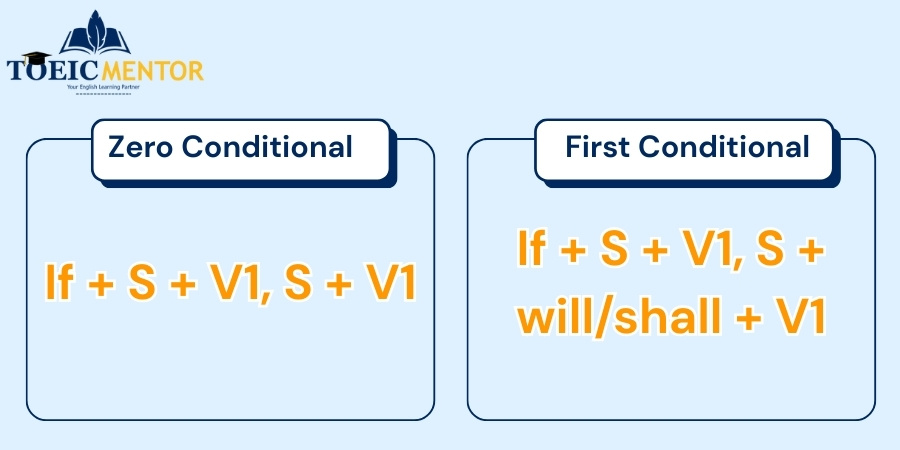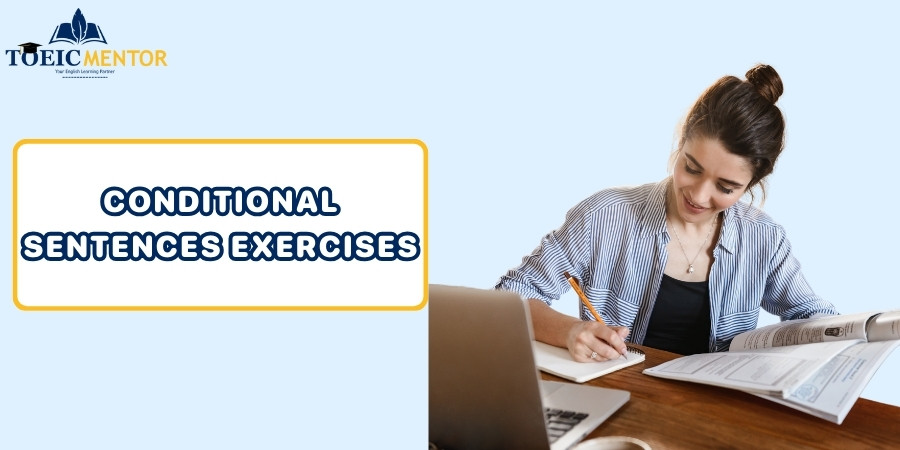คุณกำลังมองหา conditional sentences exercises ที่ครอบคลุมทุกระดับหรือไม่? บทความนี้รวบรวมแบบฝึกหัดขั้นเทพ 8 ข้อตั้งแต่ Zero, First, Second, Third Conditionals จนถึง Mixed และ Inversion พร้อมเฉลยละเอียดที่จะทำให้คุณเข้าใจหลักการและสามารถประยุกต์ใช้ได้อย่างเชี่ยวชาญ! ไม่ว่าจะเป็นผู้เริ่มต้นหรือระดับสูง ทุกคนจะได้รับประโยชน์สูงสุดจากแบบฝึกหัด conditional sentences ที่คัดสรรมาเป็นพิเศษ
I. สรุป If-Clause ฉบับเร่งรัดและภาพรวมแบบฝึกหัด
ยินดีต้อนรับสู่บทความสุดยอดที่รวบรวม conditional sentences exercises ครบครันทุกระดับไว้ในที่เดียว! ที่นี่คุณจะได้พบกับสรุปหลักการแบบเข้าใจง่ายและแบบฝึกหัดตั้งแต่ระดับพื้นฐานจนถึงขั้นสูง พร้อมเฉลยและคำอธิบายละเอียดที่จะทำให้คุณเป็นผู้เชี่ยวชาญ If-Clause อย่างแท้จริง
1. ตารางสรุปโครงสร้าง If-Clause 4+1 ประเภท

| ประเภท | โครงสร้าง | การใช้งานหลัก |
| Zero Conditional | If + S + V1, S + V1 | ความจริงที่เกิดขึ้นเสมอ กฎธรรมชาติ |
| First Conditional | If + S + V1, S + will/shall + V1 | เหตุการณ์ที่เป็นไปได้ในอนาคต |
| Second Conditional | If + S + V2/were, S + would + V1 | สถานการณ์สมมติในปัจจุบัน/อนาคต |
| Third Conditional | If + S + had V3, S + would have + V3 | สถานการณ์สมมติในอดีต (เสียใจ) |
| Mixed Conditional | If + S + had V3, S + would + V1 | อดีตส่งผลต่อปัจจุบัน |
2. ภาพรวมแบบฝึกหัดในบทความนี้
แบบฝึกหัดในบทความนี้แบ่งเป็น 3 ส่วนหลัก เพื่อให้คุณเลือกฝึกฝนในส่วนที่เหมาะสมกับระดับของตนเอง:
- ส่วนที่ 1: พื้นฐาน – ฝึกแยกประเภท Zero, First, Second, Third Conditionals ทีละประเภท
- ส่วนที่ 2: ประยุกต์ – ทดสอบความเข้าใจแบบรวมทุกประเภทและแก้ไขข้อผิดพลาด
- ส่วนที่ 3: ขั้นสูง – ท้าทายด้วย Mixed Conditionals และ Inversion
II. แบบฝึกหัดประโยคเงื่อนไขพื้นฐาน
ส่วนนี้จะเน้นการฝึกฝน conditional sentences exercises ทีละประเภทเพื่อสร้างความเข้าใจพื้นฐานที่แข็งแกร่งก่อนเข้าสู่ระดับที่ซับซ้อนขึ้น
แบบฝึกหัดที่ 1: Zero Conditional
ใช้กับเหตุการณ์ที่เป็นความจริงเสมอ กฎธรรมชาติ และสิ่งที่เกิดขึ้นตามปกติ
แบบฝึกหัด: เติมกริยาในรูปที่ถูกต้อง
- If you _______ (heat) water to 100°C, it _______ (boil).
- If people _______ (not eat) for a long time, they _______ (feel) hungry.
- If it _______ (rain) heavily, the roads _______ (become) slippery.
- If you _______ (press) this button, the machine _______ (start).
- If ice _______ (melt), it _______ (turn) into water.
เฉลย:
- heat, boils (ความจริงทางธรรมชาติ)
- don’t eat, feel (กฎทั่วไปของร่างกาย)
- rains, become (สถานการณ์ที่เกิดขึ้นเสมอ)
- press, starts (การทำงานของเครื่องจักร)
- melts, turns (กฎทางฟิสิกส์)
แบบฝึกหัดที่ 2: First Conditional
ใช้กับเหตุการณ์ที่เป็นไปได้ในอนาคต มีโอกาสเกิดขึ้นจริง
แบบฝึกหัด: เติมกริยาในรูปที่ถูกต้อง
- If she _______ (study) hard, she _______ (pass) the exam.
- If we _______ (leave) now, we _______ (arrive) on time.
- If you _______ (not wear) a coat, you _______ (get) cold.
- If they _______ (invite) me, I _______ (go) to the party.
- If it _______ (be) sunny tomorrow, we _______ (have) a picnic.
เฉลย:
- studies, will pass (เป็นไปได้ว่าจะสอบผ่าน)
- leave, will arrive (มีโอกาสไปถึงทันเวลา)
- don’t wear, will get (เป็นไปได้ว่าจะหนาว)
- invite, will go (จะไปถ้าได้รับเชิญ)
- is, will have (จะปิกนิกถ้าแดดออก)
แบบฝึกหัดที่ 3: Second Conditional
ใช้กับสถานการณ์สมมติในปัจจุบันหรืออนาคต ที่ไม่เป็นจริงหรือเป็นไปได้ยาก
แบบฝึกหัด: เติมกริยาในรูปที่ถูกต้อง
- If I _______ (be) rich, I _______ (buy) a big house.
- If she _______ (speak) Thai, she _______ (understand) us better.
- If we _______ (have) more time, we _______ (visit) more places.
- If you _______ (be) the president, what _______ you _______ (do)?
- If it _______ (rain) money, everyone _______ (be) happy.
เฉลย:
- were, would buy (สมมติว่ารวย)
- spoke, would understand (สมมติว่าพูดไทยได้)
- had, would visit (สมมติว่ามีเวลามากกว่านี้)
- were, would, do (สมมติว่าเป็นประธานาธิบดี)
- rained, would be (เหตุการณ์เป็นไปไม่ได้)
แบบฝึกหัดที่ 4: Third Conditional
ใช้กับสถานการณ์สมมติในอดีต เหตุการณ์ที่ผ่านไปแล้วและไม่สามารถเปลี่ยนแปลงได้
แบบฝึกหัด: เติมกริยาในรูปที่ถูกต้อง
- If she _______ (study) harder, she _______ (pass) the exam.
- If we _______ (leave) earlier, we _______ (not miss) the train.
- If you _______ (tell) me the truth, I _______ (help) you.
- If they _______ (bring) an umbrella, they _______ (not get) wet.
- If I _______ (know) about the meeting, I _______ (attend) it.
เฉลย:
- had studied, would have passed (เสียใจที่ไม่ได้เรียนหนัก)
- had left, wouldn’t have missed (เสียใจที่ออกไปช้า)
- had told, would have helped (เสียใจที่ไม่ได้บอกความจริง)
- had brought, wouldn’t have gotten (เสียใจที่ไม่ได้เอาร่มไป)
- had known, would have attended (เสียใจที่ไม่รู้เรื่องการประชุม)
III. แบบฝึกหัดประโยคเงื่อนไขเชิงประยุกต์
หลังจากฝึกแยกประเภทแล้ว ส่วนนี้จะทดสอบความสามารถในการนำ แบบฝึกหัด conditional sentences ทั้งหมดมาประยุกต์ใช้ในสถานการณ์ที่ซับซ้อนขึ้น
แบบฝึกหัดที่ 5: รวม Conditional Sentences (Types 0-3)
แบบฝึกหัด: เลือกรูปแบบ Conditional ที่เหมาะสมและเติมกริยา
- If I _______ (win) the lottery last year, I _______ (be) rich now.
- If water _______ (freeze), it _______ (expand).
- If she _______ (call) me tomorrow, I _______ (answer).
- If he _______ (be) more careful, he _______ (not have) accidents.
- If they _______ (arrive) on time yesterday, we _______ (start) the meeting.
เฉลย:
- had won, would be (Mixed: อดีตส่งผลปัจจุบัน)
- freezes, expands (Zero: กฎธรรมชาติ)
- calls, will answer (First: เป็นไปได้ในอนาคต)
- were, wouldn’t have (Second: สมมติปัจจุบัน)
- had arrived, would have started (Third: สมมติอดีต)
แบบฝึกหัดที่ 6: การแก้ไขข้อผิดพลาด (Error Correction)
แบบฝึกหัด: แก้ไขประโยคที่ผิดให้ถูกต้อง
- If I will have time tomorrow, I will visit you.
- If I was you, I would study harder.
- If he would have studied, he would pass the exam.
- If she will come to the party, she will have fun.
- If I would be rich, I would travel around the world.
เฉลย:
- If I have time tomorrow, I will visit you. (ผิดเพราะใช้ will ใน if-clause)
- If I were you, I would study harder. (ต้องใช้ were กับทุกประธาน)
- If he had studied, he would have passed the exam. (Third conditional ผิดรูป)
- If she comes to the party, she will have fun. (First conditional ใช้ present tense)
- If I were rich, I would travel around the world. (Second conditional ใช้ were)
IV. แบบฝึกหัดประโยคเงื่อนไขขั้นสูง
นี่คือส่วนสำหรับผู้ที่ต้องการความท้าทายและฝึกฝนหัวข้อขั้นสูงที่ยากเป็นพิเศษ
แบบฝึกหัดที่ 7: Mixed Conditionals (เงื่อนไขข้ามเวลา)
Mixed Conditionals เป็นการผสมผสานระหว่างเวลาที่ต่างกัน มักใช้แสดงว่าเหตุการณ์ในอดีตส่งผลต่อสถานการณ์ปัจจุบัน
แบบฝึกหัด: เติมกริยาในรูป Mixed Conditional
- If she _______ (take) that job offer last year, she _______ (be) happier now.
- If I _______ (learn) English as a child, I _______ (speak) it fluently today.
- If they _______ (invest) in that company, they _______ (be) millionaires now.
- If he _______ (not smoke) all his life, he _______ (be) healthier today.
เฉลย:
- had taken, would be (การตัดสินใจในอดีตส่งผลปัจจุบัน)
- had learned, would speak (การเรียนรู้ในอดีตส่งผลปัจจุบัน)
- had invested, would be (การลงทุนในอดีตส่งผลปัจจุบัน)
- hadn’t smoked, would be (พฤติกรรมในอดีตส่งผลปัจจุบัน)
แบบฝึกหัดที่ 8: การสลับตำแหน่งประโยค (Inversion)
Inversion เป็นการเขียนแบบทางการที่นำกริยาช่วยมาไว้หน้าประธาน โดยตัด if ออก ทำให้ประโยคดูเป็นทางการและสง่างามมากขึ้น
แบบฝึกหัด: เปลี่ยนประโยคให้เป็นรูป Inversion
- If you had told me earlier, I would have helped.
- If I were in your position, I would accept the offer.
- If she should call, please let me know.
- If we had known about the traffic, we would have left earlier.
เฉลย:
- Had you told me earlier, I would have helped.
- Were I in your position, I would accept the offer.
- Should she call, please let me know.
- Had we known about the traffic, we would have left earlier.
V. ถาม-ตอบภาษาศาสตร์ เคลียร์ทุกข้อสงสัย
คุณได้ฝึกฝนทักษะ conditional sentences exercises ไปแล้ว ตอนนี้เรามาดูเบื้องหลังและหลักการทางภาษาศาสตร์ที่น่าสนใจเพื่อความเข้าใจที่สมบูรณ์ยิ่งขึ้นกัน
1. ทำไม Second Conditional ถึงใช้ ‘were’ กับทุกประธาน?
การใช้ ‘were’ กับทุกประธานใน Second Conditional เป็น Subjunctive Mood ที่มาจากภาษาอังกฤษโบราณ ซึ่งแสดงถึงสถานการณ์ที่ไม่เป็นจริงหรือขัดกับความเป็นจริง แม้ว่าในปัจจุบันจะใช้ ‘was’ กับประธานเอกพจน์ได้ แต่ ‘were’ ยังคงเป็นรูปแบบที่ถูกต้องและเป็นทางการมากกว่า
2. Mixed Conditionals มีกี่รูปแบบและใช้เมื่อไหร่?
Mixed Conditionals มี 2 รูปแบบหลัก: รูปแบบที่ 1 คือ Past Perfect + Present Conditional (อดีตส่งผลปัจจุบัน) และรูปแบบที่ 2 คือ Past Simple + Perfect Conditional (ความจริงปัจจุบันส่งผลอดีต) โดยใช้เมื่อต้องการเชื่อมโยงเหตุการณ์ข้ามเวลา
3. การใช้ Inversion ในภาษาอังกฤษทำให้ความหมายเปลี่ยนไปหรือไม่?
Inversion ไม่ทำให้ความหมายเปลี่ยนแปลง แต่เพิ่มระดับความเป็นทางการและความสง่างามให้กับประโยค มักพบในงานเขียนทางการ วรรณกรรม และการพูดในโอกาสสำคัญ ทำให้ผู้พูดดูมีความรู้และความสามารถทางภาษาสูง
หัวใจสำคัญของการเรียน Conditional Sentences ไม่ใช่แค่การจำกฎไวยากรณ์ แต่คือการเข้าใจและนำไปใช้สื่อสารได้อย่างเป็นธรรมชาติ เมื่อคุณฝึกฝนแบบฝึกหัดเหล่านี้อย่างสม่ำเสมอ คุณจะสามารถใช้ If-Clause ในชีวิตประจำวันได้อย่างคล่องแคล่วและมั่นใจ จงมุ่งมั่นฝึกฝนต่อไป เพราะทุกความพยายามจะนำคุณไปสู่ความเป็นเลิศในภาษาอังกฤษ!

